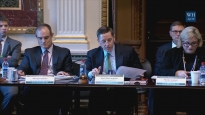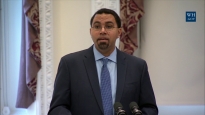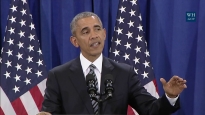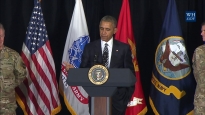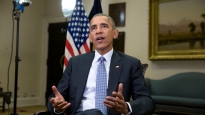President Obama and Prime Minister Singh Press Conference
November 24, 2009 | 26:56
President Obama and Prime Minister Singh of the Republic of India hold a joint press conference in the East Room of the White House on November 24, 2009. (Public Domain)
Remarks by President Obama and Prime Minister Singh of India in Joint Press Conference
12:04 P.M. EST
PRESIDENT OBAMA: Please be seated. Hello, everybody. Namaste. I am very pleased to welcome Prime Minister Singh to the White House on this, the first official visit of my presidency. As I said earlier, this reflects our admiration for the Prime Minister's leadership, the deep bonds between the peoples of the United States and India, and the historic opportunity we have to strengthen and broaden the partnership between our nations.
India today is a rising and responsible global power. In Asia, Indian leadership is expanding prosperity and the security across the region. And the United States welcomes and encourages India's leadership role in helping to shape the rise of a stable, peaceful, and prosperous Asia.
Beyond Asia, as the world's largest multiethnic democracy, as one of the world's fastest-growing economies, and as a member of the G20, India will play a pivotal role in meeting the major challenges we face today. And this includes my top economic priority, creating good jobs with good wages for the American people.
So I believe that the relationship between the United States and India will be one of the defining partnerships of the 21st century, and this visit underscores the strengthening of that partnership, which I hope will continue throughout my presidency. That's why I've made it a priority to broaden the cooperation between our nations.
My administration's commitment to India can be seen in our new strategic dialogue, which addresses the full range of challenges and opportunities before us. And I'm pleased that we're joined today by the co-chairs of our dialogue -- Secretary of State Hillary Clinton and Foreign Minister Krishna.
And our commitment to India can be seen in my personal partnership with Prime Minister Singh. We've worked together on economic matters at our G20 summits in London and Pittsburgh, as well as L'Aquila. I consider him a wise leader who has helped unleash India's extraordinary economic growth. He is a man of honesty and integrity. I respect him and I trust him, and I have happily accepted his gracious invitation to visit India next year.
Now, this spirit of friendship infuses our very productive discussions today and is the reason we've made so much progress in recent years. We agreed to strengthen the economic recovery and expand trade and investment so we can create jobs for both our peoples -- Americans and Indians.
Indian investment in America is creating and sustaining jobs across the United States. The United States is India's largest trading and investment partner. There is significant balance in our trading relationships that I think is very important and reflective of the framework that we put forward at the G20. And to sustain this momentum we're creating new initiatives to promote trade, investment and technology cooperation, especially among our small and medium-sized businesses that create most of the jobs here in the United States.
I reaffirmed to the Prime Minister my administration's commitment to fully implement the U.S.-India Civil Nuclear Agreement, which will increase American exports and create jobs in both countries.
We agreed to move forward with our commitments at the G20 summit in Pittsburgh to pursue balanced growth while ensuring that emerging economies like India have a greater voice in shaping the international financial architecture.
We've made progress in confronting climate change. I commended the Prime Minister for India's leadership in areas like green buildings and energy efficiency, and we agreed to a series of important new efforts: a clean energy initiative that will create jobs and improve people's access to cleaner, more affordable energy; a green partnership to reduce poverty through sustainable and equitable development; and an historic effort to phase out subsidies for fossil fuels.
With just two weeks until the beginning of Copenhagen, it's also essential that all countries do what is necessary to reach a strong operational agreement that will confront the threat of climate change while serving as a stepping-stone to a legally binding treaty.
And to that end, Prime Minister Singh and I made important progress today. We reaffirmed that an agreement in Copenhagen should be comprehensive and cover all the issues under negotiation. We resolved to take significant national mitigation actions that will strengthen the world's ability to combat climate change. We agreed to stand by these commitments with full transparency through appropriate processes as to their implementation. All this builds on the progress that we made in Beijing, and it takes us one step closer to a successful outcome in Copenhagen.
We also agreed to deepen our cooperation against transnational threats. The American people join our Indian friends in remembering the horrific attacks in Mumbai one year ago this week. To prevent future attacks, we agreed that our law enforcement and intelligence agencies will work even closer, including sharing more information. We discussed my review of our policy in Afghanistan, and I thanked Prime Minister Singh for India's substantial contributions to the Afghan people.
I welcomed the Prime Minister's support for the non-proliferation agenda that I laid out in Prague, and I look forward to India's participation in our nuclear summit -- nuclear security summit next year, as well as India's participation as a full partner in our shared vision of a world without nuclear weapons.
Now, part of that vision is working together to ensure that all nations, including Iran and South -- North Korea, live up to their international obligations. We agreed to expand the educational exchanges that will fuel our knowledge-based economies. We're dramatically expanding the Fulbright-Nehru program that brings so many of our students and scholars together, especially in science and technology. And we are increasing ties and exchanges between our universities and community colleges as part of a new Obama-Singh -- or Singh-Obama --(laughter) -- 21st Century Knowledge Initiative. We think it's appropriately named.
To advance our historic food security initiative, American and Indian researchers will collaborate to improve agricultural output and reduce hunger -- not only in India, where enormous strides have been made, but around the world -- and India has much to teach the developing world in terms of achieving food sufficiency.
And our Centers for Disease Control and Prevention will partner with their Indian counterparts to create a new disease detection center in India to combat infectious diseases and promote global health.
This is the concrete progress made today across a whole range of issues to create jobs, opportunity and security for our people. As a result, I believe the relationship between our two countries has never been stronger -- a reminder that it will be one of the defining partnerships of the 21st century.
We look forward to celebrating our partnership tonight, as Michelle and I host the Prime Minister and Mrs. Kaur at the first state dinner of my presidency. It will be another opportunity to convey to the Prime Minister and the people of India, as India assumes its rightful place as a global leader in this century, that you will have no better friend and partner than the United States of America.
Mr. Prime Minister, thank you so much for your presence here today. The floor is yours.
PRIME MINISTER SINGH: Mr. President, distinguished ladies and gentlemen of the media. I thank from the core of my heart President Obama for his very generous hospitality and for his very warm sentiments towards India -- and to me, in particular. I am honored to be here today in this great country at the invitation of His Excellency, the President.
When India and the United States meet, it is a moment to celebrate the values of democracy, pluralism, liberty, and freedom. Today we have done that and much more.
In our discussions today, we reaffirmed the importance of our relationship and decided on future steps to enhance our strategic partnership. We have agreed to further intensify our trade, investment, and economic cooperation in a way that creates jobs and prosperity in both our two countries and stimulates global economic recovery.
We admire the leadership that President Obama has provided to stimulate and guide the G20 process that is now fully in place. We have decided to give a fresh impetus to collaboration in the fields of education, agriculture, and health. We will deepen our ongoing cooperation in frontier areas of science and technology, nuclear power, and space. This will open new opportunities for our universities and laboratories, and create human capital to meet the global needs of the future.
We had a very constructive exchange of views on strategic issues. Our defense cooperation is progressing well. We agreed on the early and full implementation of our Civil Nuclear Cooperation Agreement. Our strategic partnership should facilitate transfer of high technologies to India. The lifting of U.S. export controls on high technology exports to India will open vast opportunities for giant research and development efforts. It will enable U.S. industry to benefit from the rapid economic and technological transformation that is now underway in our country.
In a few weeks from now, the meeting of the conference of parties to the United Nations Framework Convention on Climate Change will take place in Copenhagen. Both President Obama and I have agreed on the need for a substantive and comprehensive outcome, which would cover mitigation, adaptation, finance, and technology. We reaffirmed our intention to work to this end bilaterally and with all other countries.
We welcome the President's commitment to a major program for promotion of renewable energy, and I drew his attention to India's own ambitious national action plan on climate change, which has eight national missions covering both mitigation and adaptation.
Just as we partnered each other in the shaping of the knowledge economy, we have the opportunity today to become partners in developing the green economy of the future. I underlined India's desire to benefit from clean and energy-efficient technologies from the United States. Our partnership will contribute to global efforts to combat climate change and achieve energy security.
We had a detailed discussion on important regional and global issues. We agreed that the Indo-U.S. partnership was important for addressing the challenges of an increasingly interdependent world that we live in. The global economic crisis has brought home the fact that our prosperity is interlinked.
Our dialogue covered the need to have an open and inclusive architecture in the Asia Pacific regions. It is important for the international community to sustain its engagement in Afghanistan, to help its emergence as a modern state.
The focus -- the forces of terrorism in our region pose a grave threat to the entire civilized world and have to be defeated. President Obama and I have decided to strengthen our cooperation in the area of counterterrorism.
India welcomes the renewed international interest in nuclear disarmament and non-proliferation. We have been a consistent advocate of a world free of nuclear weapons. We will work with the United States and other countries for the success of the nuclear security summit, which President Obama is hosting next April.
In our discussions today, there was a meeting of minds on the future direction of our relations. I was deeply impressed by President Obama's strong commitment to the India-U.S. strategic partnership and by the breadth of his vision for global peace and prosperity.
I have invited President Obama to visit India. A very warm welcome awaits him, his gracious wife and his two daughters.
I thank you.
PRESIDENT OBAMA: Thank you very much.
We're going to take one question each, one from an American journalist and one from an Indian journalist. And I'm going to call on Mark Knoller. Where's Mark? There you are. Good to see you, Mark.
Q Good to see you, sir. Mr. President, I suspect you don't want my colleagues and I to rely on leaks until next week, so I'd like to ask you about --
PRESIDENT OBAMA: Why stop now? (Laughter.)
Q Well, perhaps you'd like to help us set a new stage in our relationship by telling us where you stand on your decision on Afghanistan. You had your -- what we were told was your final meeting last evening. Can you tell us how many more troops you'll be sending to Afghanistan, how you'll be paying for them, and whether you'll be announcing a timetable and/or exit strategy for them?
PRESIDENT OBAMA: Mark, I will be making an announcement to the American people about how we intend to move forward. I will be doing so shortly.
I think that the review that we've gone through has been comprehensive and extremely useful, and has brought together my key military advisors, but also civilian advisors. I can tell you, as I've said before, that it is in our strategic interest, in our national security interest to make sure that al Qaeda and its extremist allies cannot operate effectively in those areas. We are going to dismantle and degrade their capabilities and ultimately dismantle and destroy their networks. And Afghanistan's stability is important to that process.
I've also indicated that after eight years -- some of those years in which we did not have, I think, either the resources or the strategy to get the job done -- it is my intention to finish the job. And I feel very confident that when the American people hear a clear rationale for what we're doing there and how we intend to achieve our goals that they will be supportive.
Now, I think it's worth mentioning since I'm with the Prime Minister of India that this important not just to the United States, but it's important to the world, and that the whole world I think has a core security interest in making sure that the kind of extremism and violence that you've seen emanating from this region is tackled, confronted in a serious way.
Now, we have to do it as part of a broader international community. And so one of the things I'm going to be discussing is the obligations of our international partners in this process. It's going to be very important to recognize that the Afghan people ultimately are going to have to provide for their own security. And so we'll be discussing that process whereby Afghan security forces are properly trained and equipped to do the job. And it's going to be important to recognize that in order for us to succeed there you've got to have a comprehensive strategy that includes civilian and diplomatic efforts.
So I think that's a sufficient preview to last until after Thanksgiving, Mark.
Q Tuesday night, sir?
PRESIDENT OBAMA: After Thanksgiving. (Laughter.) And I'm sure that at that point, if there are further questions, that we'll be answering them to the satisfaction not just of you, but to the satisfaction of the American people.
PRIME MINISTER SINGH: Ms. Smita Prakash.
Q My question to you: Would you call India and the U.S. as natural allies, especially in the sphere of combating the terrorism in our region? Because there is a perception in India that the military aid that you give Pakistan is misused against India, and it is really the epicenter of terrorism. Did this issue come up in your discussions with the Prime Minister, and would you be pressurizing Pakistan to get its act in order? And to the Prime Minister, I'd like to ask when is the nuclear deal really going to go on the road?
PRESIDENT OBAMA: Well, first of all, I think that the United States and India are natural allies not just around counterterrorism issues, but on a whole host of issues. As we discussed earlier, we're the world's two largest democracies. We have a range of shared values and ideals. We're both entrepreneurial societies. We're both multiethnic societies. We are societies that believe in human rights and core freedoms that are enshrined in our founding documents.
And one of the things that I think makes us such strong allies is the people-to-people contact. It's one thing for leaders to have exchanges like this one, and that's very important, obviously. But the incredible contributions that Indian Americans have made to the growth of our country and the degree to which they are woven into the very fabric of our society, the fact that very few Indians don't have some family member somewhere who has a connection to the United States -- that kind of exchange strengthens and deepens the bonds between our two countries in a profound way.
Now, with respect to security issues in the region, the Prime Minister and I -- Prime Minister Singh and I had extensive discussions about that. I think we both recognize that our core goal is to achieve peace and security for all peoples in the region, not just one country or the other. And one of the things I admire most about Prime Minister Singh is that I think at his core he is a man of peace.
Obviously there are historic conflicts between India and Pakistan. It is not the place of the United States to try to, from the outside, resolve all those conflicts. On the other hand, we want to be encouraging of ways in which both India and Pakistan can feel secure, and focus on the development of their own countries and their own people.
With respect to the relationship between the United States and Pakistan's military, I think that there have probably been times in the past in which we were so single-mindedly focused just on military assistance in Pakistan that we didn't think more broadly about how to encourage and develop the kinds of civil society in Pakistan that would make a difference in the lives of people day to day.
And Secretary Clinton, I think, has done an excellent job in trying to move forward -- where is she? I thought she was around here somewhere -- but anyway, she's done an excellent job, I think, in helping our State Department to refocus our energies on that front as well.
And obviously Pakistan has an enormously important role in the security of the region by making sure that the extremist organizations that often operate out of its territories are dealt with effectively. And we've seen some progress. The work that the Pakistan military is doing in the Swat Valley in west -- in south Waziristan all indicates the degree to which they are beginning to recognize that extremism, even if initially directed to the outside, can ultimately also have an adverse impact on their security internally.
So my hope is, is that over time what we're going to see is further clarity and further cooperation between all the parties and all peoples of goodwill in the region to eradiate terrorist activity, to eradicate the kind of violent extremism that we've seen. I think that will benefit the peoples of Pakistan and India and the world community as well.
PRIME MINISTER SINGH: The President and myself had a very useful and productive exchange of views relating to security, peace, and counterterrorism in our regions. I'm very satisfied with the outcome of my discussion with President Obama.
As far as the nuclear deal is concerned, the President has reaffirmed that it is the common resolve of our two governments to operationalize the nuclear deal as early as possible. There are a few "i's" and "t's" which have to be crossed -- and I am confident and I have the assurance of the President that that process can be completed without much further loss of time.
PRESIDENT OBAMA: Thank you very much, everybody.
END
12:30 P.M. EST
|
December 7, 2016
|
December 7, 2016
|
December 7, 2016
|
December 6, 2016
|
|
December 6, 2016
|
December 5, 2016
|
December 4, 2016
|
December 3, 2016
|
- &lsaquo previous
- …
- 3
- 4
- 5
- 6
- 7
- 8
- 9
- 10
- 11
- …
- next &rsaquo

